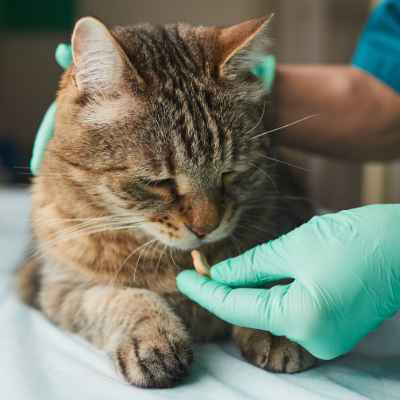Whilst our domesticated feline friends may like to think of themselves as little wild jungle cats, they still require our assistance to stay healthy, starting with the protection of a regular vaccination and parasite control program. Here’s how you can practically achieve optimal protection for your resident feline, even if they are acting a bit like a jungle cat!
Feline vaccination
The F4 vaccination is recommended for every cat who comes into contact with other cats, whether at home, outdoors or in boarding. This vaccine helps to protect them against the effects of feline panleucopaenia (similar to parvovirus in dogs) and two of the most common causes of cat flu – feline calicivirus and feline herpesvirus.
To keep optimal immunity, most cats require a series of three kitten vaccinations ( at six-eight weeks of age, 10-12 weeks and 16-18 weeks) and then an annual booster.
If you know your cat becomes very fearful during car journeys or shows anxious or aggressive behaviours in the clinic, have a chat with our friendly veterinary team. Depending on your pet’s particular demeanour, we may be able to recommend calming scent pheromone sprays for the journey or sedative medications that you can administer at home (directly into your cat’s mouth or via food) to reduce their anxiety.
Feline parasite control
We recommend regular flea control for most cats, even if they live indoors, as fleas can be brought in by other household pets or on human shoes.
Any cat that goes outdoors or into boarding is recommended to be on a regular, year-round routine of flea and worming prevention and, if applicable to your local area, tick prevention as well. There are effective topical products that cover fleas, ticks and some common intestinal worms (which last from one-to-three month’s duration). Depending on your pet’s lifestyle, we may also recommend the addition of a worming tablet every three months.
Whilst this may sound easy in theory, we understand that not every cat will be cooperative!
Most topical products are designed to be administered to the skin at the back of your cat’s neck/scruff area, where they can’t lick it off. It can really help to perform a gentle towel wrap restraint of your cat if they get wriggly, as demonstrated in this video. It may also help to distract them with a tasty lickable treat pouch during the process, and remember to always have a treat ready for your cat afterwards as a positive reward!
Administering tablets to cats requires gentle restraint and correct technique. Here is a video that demonstrates good techniques for giving tablets to your cat. It can also help to coat tablets in butter, or to hide unpalatable tablets in flavourless gelatin capsules, which can be purchased at a pharmacy.
If you’re really struggling to administer routine treatments to your cat, have a chat with our team. Depending on the particular treatment, we may be able to recommend an easier, alternative product. Otherwise, our experienced nurses and vets are always happy to provide hands-on help for you and your pet in-clinic. Together, we can keep your little jungle cat happy and healthy!

